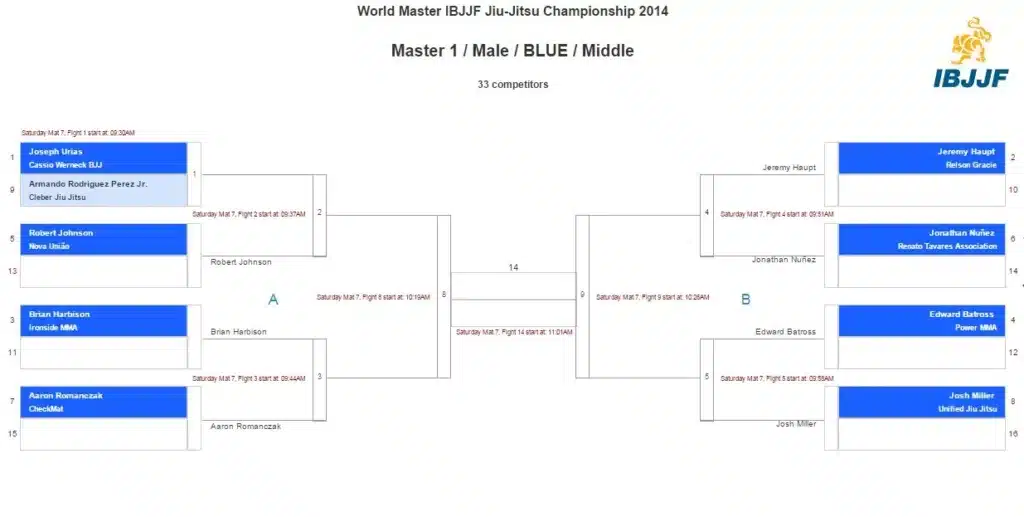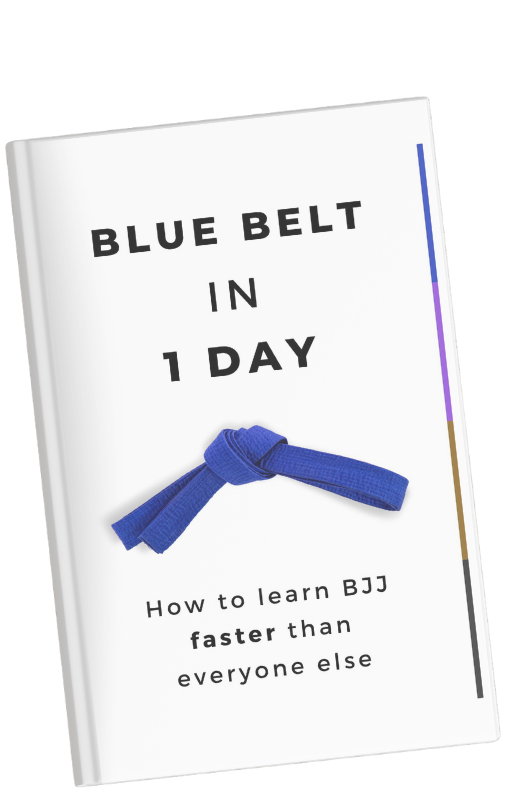Are you ready to win your first Brazilian Jiu Jitsu competition? Look no further! This comprehensive guide covers everything you need to know. We’ll go through every aspect, from preparation to performance, to make sure you’re fully equipped to succeed on the mat. We’ve also got tips and tricks for more experienced fighters. So, whether this is your first tournament or you’re adding to your collection of wins, read on and discover how to come out on top.

How most BJJ competitions work
Let’s start with the basics of how most BJJ competitions are organized at the white belt level.
The popular BJJ competition formats
Brazilian Jiu-Jitsu (BJJ) competitions can vary greatly in terms of format and structure. One of the most common formats is the single-elimination tournament, also known as a knockout tournament. In this format, competitors are eliminated from the competition after one loss. This means that if you lose a match, you are out of the tournament and cannot compete for the top prize.
Another format is the double-elimination tournament, in which losers are put in the loser’s bracket and compete for the bronze medal. This format guarantees you at least 2 matches.
Another format is the round-robin tournament (see table below), in which competitors face off against each other in a predetermined number of matches, regardless of whether they win or lose. In this format, even if you lose a match, you will still have the opportunity to compete in other matches and potentially place in the tournament. In some competitions there are finals after the rounds, but not always (that also depends on the size of the bracket).
| Round 1 | Competitor 1 vs competitor 2 |
| Round 1 | Competitor 3 vs competitor 4 |
| Round 2 | Competitor 1 vs competitor 3 |
| Round 2 | Competitor 2 vs competitor 4 |
| Round 3 | Competitor 1 vs competitor 4 |
| Round 3 | Competitor 2 vs competitor 3 |
How many rounds will you have?
For white belts, competitions can be very deep and I’ve seen white belts have up to 8 matches up to the final. This is because the pool of competitors is usually very large. But if you’re in a division with fewer competitors. you could have 4 matches or even less.
What’s the round time for white belts?
In terms of round time, most BJJ competitions have rounds that last 5 minutes. Maybe that doesn’t sound very long, but I promise you it’s more than plenty. However, if a competitor submits their opponent before the 5 minutes are up, the match is over and the competitor who submitted their opponent is declared the winner. This is one of the reasons why it is important to be well-versed in submission techniques and to be in good physical condition.
Rules at white belt competitions
The rules differ per tournament, so always check on the official tournament website. However, the common rules for white belt divisions are:
- Points and round times as I described them above
- Illegal submissions: wrist locks, all leg locks except straight footlocks (note that some no gi tournaments may allow more types of leg locks even at the white belt level)
- Other illegal moves: neck holds, slams, grabbing single fingers or toes
- Clothing rules: there’s usually rules about the size and color of your BJJ uniform, white gis are always allowed, read more in out post about competition gis.
How exactly do BJJ tournament logistics work?
Let’s dive more deeply into some other logistics that competitors should be aware of when preparing for a BJJ competition. Even though these all happen before you even have your first match, they largely determine your success in competition.
The brackets
In most BJJ tournaments, the brackets (which indicate who fights who) are usually posted online a few days prior to the event. This allows competitors to see when their first match is scheduled and plan accordingly. Knowing the approximate time of your first match will help you to prepare both physically and mentally, and you’ll know when you have to show up to the tournament venue.
It’s important to note that the brackets are always subject to change, so you should always check back for updates, and be prepared for any changes.

Weigh-ins
One of the most important moments before a BJJ competition is the weigh-in. Most tournaments require competitors to weigh in on the morning of the tournament or upon arrival. The weigh-in process can vary, but typically competitors will step on a scale wearing either their gi or underwear. It’s important to note that some tournaments have strict weigh-in limits, while others allow a small pound ‘allowance’ so you can be a little heavier than the actual weight limit.
The warm-up area
Another important aspect to be aware of is the warm-up area. This is typically a designated area where competitors can stretch, roll, and get ready for their matches. However, it’s important to note that this area is usually small and crowded, so it’s important to arrive early to secure a spot. Additionally, competitors should be prepared for the fact that the warm-up area may not be open until an hour or so before their division starts.
Getting the call
One of the most nerve-wracking things about competition is the uncertainty of when you will be called to compete. It’s common for competitors to have to wait around for long periods of time before their matches, and then to be called to compete suddenly while they are not even fully warmed up yet. This is why it’s important to have a good pre-match routine that allows you to stay focused and mentally prepared, even if you have to wait around for a long time.
What happens in your first BJJ match?
When you are called to the mat to compete, you and your opponent will be assigned a marker, such as a yellow and green belt or an ankle brace, to help the referee award points to the appropriate competitor.
You’ll walk past the referee table to the middle of the mat, bow to the referee, and bow to your opponent. Then the referee signals the start of the match, and you get to work your magic 🙂
During the match, the goal is to earn more points than your opponent by utilizing various techniques. Most BJJ competitions use the following point system:
- 2 points for takedowns and sweeps
- 3 points for guard passes and knee on belly
- 4 points for mount and back mount
As a white belt competitor, it’s important to focus on earning points through effective technique execution, while also being aware of opportunities to submit your opponent. Submission wins are quite common at the white belt level, probably around 50%.
The match will be over when the time runs out, or if one of the competitor submits their opponent. The competitor with the most points or the one who submitted the opponent wins the match.
Once the match ends, the referee gets both fighters to the middle of the mat again and raises the hand of the winner. This is a good moment to shake the hand of your opponent (win or lose), the referee and your opponent’s coach.
Write what happens after your first match?
After your first match, there are a few things that you can expect to happen.
First and foremost, you will need to take some time to recover and rest. This might include stretching, hydrating, and taking a break to relax and catch your breath.
If you won your match, you will need to be ready for your next one, which could be in a few minutes or a few hours depending on the tournament format and how deep the bracket is.
If you lost your match, you may be eliminated from the tournament, but you will still have the opportunity to watch the other matches. You should find your buddies from your gym and hang out with them, maybe get something to eat or drink at the venue, that sort of a thing.
What happens if you win the tournament?
If you win the tournament, there are a few things that you can expect to happen, you will be awarded a medal or trophy, and you will be recognized as the champion of your weight class and/or belt level. Maybe you even get a cash prize, although I’ve never seen that before at the white belt level.
You might also get the chance to register for the open weight class. Not all tournaments do this anymore, but it’s super fun if they do. The open class usually puts the medalists of all divisions against each other, and this is where hero’s are born (think about Lachlan Giles submitting the big guys at ADCC).
Winning a tournament can be a great confidence boost and a validation of your hard work and dedication to the sport. But it’s important to remember to be humble and gracious in victory and thank the organization, the referee and your opponents for the opportunity to compete.
How to win your first BJJ tournament (5 tips)
To excel and win at your first BJJ tournament, there are several key factors to consider in your preparation:
- Being on weight: The only way you can mess up your tournament completely is by not making weight. And at the white belt level, I recommend to register for the division that you can make without doing any weight cut at all. At this level, the difference in skill level is what determines the outcome of almost all the fights. The weight is not relevant.
- Good cardio: If technique is the most important factor for who wins the match, cardio is the second most important factor. You’ll always see that if one guy gets tired and the other doesn’t, the tired guy loses instantly. And you’ll have many matches so you need to build up a big gas tank.
- Drill and practice: Make sure you drill and practice the techniques and strategies you plan to use in competition. This will help you to execute them smoothly and efficiently during the match.
- Initiative: “He who moves first, usually wins” and this is why taking initiative is so important. It allows you to control where the match goes. And you want the match to go towards where you’re strong, not where your opponent is strong.
- Easy game plan: Having a simple game plan will make it easier for you to focus on executing your techniques during the match. You should have as little techniques as possible in your game plan, because your adrenaline will make you forget everything.
Don’t you have an easy game plan yet? Check out the impossible to forget beginner game plan in Blue Belt in 1 Day. It consists of only 4 techniques that work together to lead to a quick submission victor.

Blue Belt in 1 Day
*Includes the impossible-to-forget beginner game plan for quick and easy competition wins
Should I compete in BJJ? (self assesment checklist)
I want to end this article by allowing yourself to answer the question: am I ready to compete in BJJ? Answer every question in this checklist to help determine if competing in Brazilian jiu jitsu is right for you:
- Are you physically fit enough to spar at maximal capacity for 5 minutes?
- Have you been training regularly and consistently for at least the last 3 months?
- Are you comfortable dealing with assertive, potentially even agressive, opponents?
- Are you willing to push yourself both mentally and physically during competition?
- Are you open to criticism and willing to learn from losses?
- Do you have the support of your family, friends, and training partners?
- What’s your reason to compete and can you consider your competition a success even if you don’t win?
- Are you able to handle the pressure and nerves that come with competition?
- Do you have a game plan or strategy for your matches, so you don’t end up in a shoving contest where very little jiu jitsu happens?
- Do you have a clear understanding of the rules and regulations of Brazilian jiu jitsu competition?
Answering these questions honestly can help give you a better idea of whether or not competing in Brazilian jiu jitsu is right for you at this time.
FAQ
Are BJJ competitions dangerous?
BJJ is a full contact sport and accidents happen. You should expect to get some bruises and minor injuries, and of course there’s also a chance for big injuries. You can still diminish your injury risk by tapping to submissions (which some people refuse) and generally keeping your own safety in mind.
What Color Gi to wear For Bjj Competition?
The rules regarding gi color can differ across BJJ competitions, but white is always legal and blue and black are almost always legal too. Other colors are often legal but you have to check the official competition rules.
